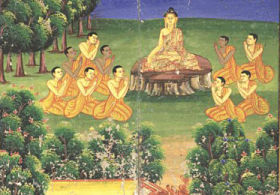10. Crossover Appeal: The Nature of the Buddha’s Teaching
The Buddha offers two parables to explain the purpose of his philosophical teaching.
Themes:
• D. Burton, “Curing Diseases of Belief and Desire: Buddhist Philosophical Therapy,” in J. Ganeri and C. Carlisle (eds), Philosophy as Therapeia (Cambridge: 2010), 187–218.
• T.N. Hanh, Thundering Silence: Sutta on Knowing the Better Way to Catch a Snake, trans. Annabel Laity (Berkeley: 1993).
• P. Harvey, An Introduction to Buddhist Ethics: Foundations, Values, and Issues (Cambridge: 2000).
• K. N. Jayatilleke, “The Buddhist Conception of Truth,” in his The Message of the Buddha (Kandy: 2000), ch. 3.
• D. Keown, The Nature of Buddhist Ethics (Basingstoke: 1992).
• J. Schroeder, “Truth, Deception, and Skillful Means in the Lotus Sūtra,” Asian Philosophy 21 (2011), 35–52.

Origins


 ..
..



Comments
Lotus sūtra etc.
Dear Peter,
once again, thanks so much for these interesting, yet also entertaining podcasts. I finally have something to recommend to friends who do not know about (Indian) philosophy and want to get an idea.
This being said, I wonder whether it is me or you, but I have the impression that you were more cautious in the episodes about Ancient Greece, in which you would say again and again that something might be attributed to X (say: Thales), but was only transmitted in texts composed well after X's death and so on. Here, by contrast, you seem to me to be over-confident in the possibility to directly read (and not just "reconstruct") the thought of the historical Buddha. Now, I do not want to say that this is impossibile, I would just emphasise that it is not so straightforward, since the Suttas are the result of the redaction of the Buddha's sayings and have not been composed by him (somewhat like the Gospels, with for instance John adjusting Jesus' role to Neoplatonism ---was this really what Jesus said? Perhaps). This becomes even more evident in the case of your mention of the Lotus Sūtra, which is a Mahāyāna Sūtra, of which (as far as I know) no Pāli antecedent is known. Long story short: I would not use the Lotus Sūtra to reconstruct the thought of the historical Buddha, at least not without some words of caution.
In reply to Lotus sūtra etc. by elisa freschi
Sutras
Hi Elisa,
Well, I don't want to speak for Jonardon, but I was operating on the assumption that the historical Buddha is effectively out of reach, so that the podcasts are more about the way that the Buddha has been represented, not about what he did and didn't actually say and do (a bit like Socrates, on my understanding of the evidence concerning him). So ironically what you're saying here is if anything more optimistic than I was, because you are at least implying that some of the texts give us solid information.
In any case you're surely right that we should say something along these lines - it is complicated because it isn's just "historical Buddha, yes or no" but rather we have layers upon layers of reception which we (certainly I) can't really tease apart in this context. Still, I'll see if I can formulate a "reader beware" statement along these lines for the book version.
Peter
amorality of the arhat
I have heard of practices of the dzogchen tradition where a high level practitioner will perform an amoral deed (ex: kicking a dog), to see if he can keep emotional impertubability. It is not that they become immoral but amoral, liberated from dualism, and it is just a temporary test.
It is clear also that the concept of "crazy wisdom" relate to this discussion, as we can see certain famous buddhist teachers, being drunk or womanizing (C. Trungpa). Although I have heard the Dalai Lama question this method, saying it brought out the risk of confusing the students.
In reply to amorality of the arhat by matt
Amorality
Fascinating! It sounds more like something that their opponents would ascribe to them rather than a real practice, no? Actually there is, I gather, quite a bit of scholarly controversy about the arahat's relation to morality, whether that level of enlightenment involves "going beyond" morality," etc. But in my limited reading I got the impression that this, again, is either a misperception or an accusation leveled by critics.
Add new comment